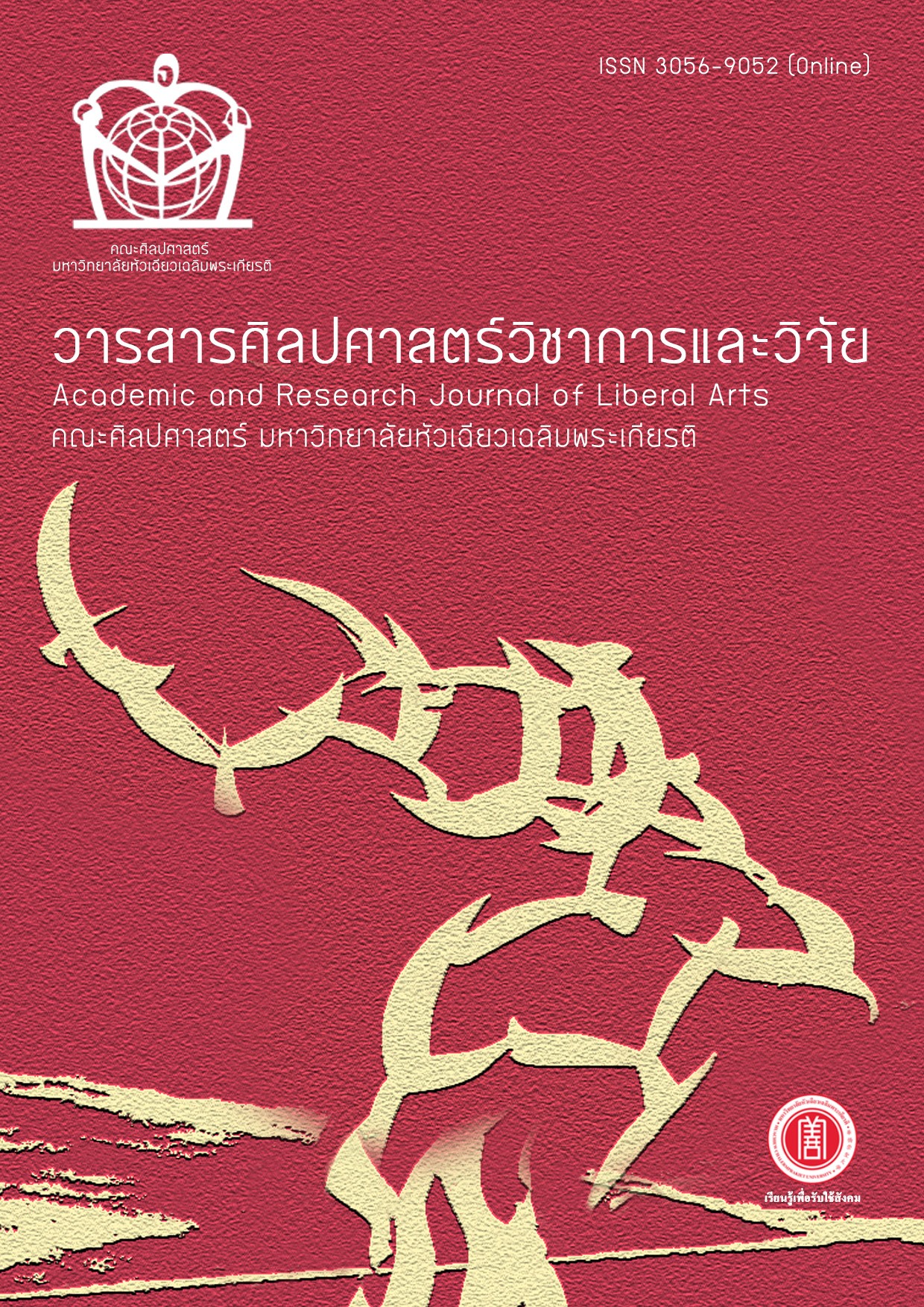Potential of Experiential Marketing Affecting the Likelihood of Gastronomy Tourists Revisiting Phatthalung Province
DOI:
https://doi.org/10.14456/arjla.2024.11Keywords:
Gastronomy Tourism, Experiential Marketing, Revisit TourismAbstract
This article aims to study the potential impact of experiential marketing on the likelihood of gastronomy tourists revisiting Phatthalung Province. The research was conducted quantitatively, collecting data through questionnaires from 400 Thai gastronomy tourists visiting Phatthalung Province, using a purposive sampling method. The study found that sensory marketing experiences in gastronomy tourism spots in Phatthalung Province have the most impact, particularly in terms of dish decoration or food presentation. The affective aspect of experiential marketing, derived from the service providers or those involved in gastronomy tourism in Phatthalung Province, demonstrates a high willingness to offer excellent service. The cognitive aspect involves providing information and knowledge about local cuisine. The behavioral aspect, related to gastronomy tourism activities in Phatthalung Province, allows participants to interact with other tourists. Finally, the transformative aspect of experiential marketing in gastronomy tourism in Phatthalung Province provides a new perspective on society rated at a high level. In conclusion, the potential of experiential marketing positively influences the likelihood of gastronomy tourists revisiting Phatthalung Province. The experiences are ranked from the highest to the lowest positive impact as follows: affective, transformative, behavioral, and sensory. However, cognitive experiences do not significantly contribute to the likelihood of repeat visitation.
References
กติกา กลิ่นจันทร์แดง. (2563). อัตลักษณ์การท่องเที่ยวเชิงวัฒนธรรมอาหารท้องถิ่นในเมืองรองทางการท่องเที่ยวของกลุ่มจังหวัดภาคตะวันออกเฉียงเหนือตอนล่าง 1 (วิทยานิพนธ์ปรัชญาดุษฎีบัณฑิต). มหาวิทยาลัยนเรศวร, พิษณุโลก.
การท่องเที่ยวแห่งประเทศไทย. (2566). Amazing Journey Go Local: พัทลุง เมืองรองของไทยต้องไปให้รู้. TourismThailand. ค้นคืนจาก https://thai.tourismthailand.org/Articles/amazing-journey-golocal-phatthalung.
ชนิตตา โชติช่วง. (2565). การใช้แนวคิดคติชนสร้างสรรค์ในการพัฒนาการท่องเที่ยวชุมชนโดยรอบเขื่อนป่าสักชลสิทธิ์. วารสารศิลปศาสตร์ปริทัศน์, 17(1), 29-46.
ชมพูนุท ภาณุภาส, ปัญจพร ธนาวชิรานันท์, และกิ่งกนก เสาวภาวงศ์. (2564). ศักยภาพการท่องเที่ยวเชิงอาหารตามอัตลักษณ์พื้นที่นครแม่สอด จังหวัดตาก. วารสารมหาวิทยาลัยคริสเตียน, 27(2), 46-61.
นะกะวี ด่านลาพล. (2561). ศิลปะการจัดจานและออกแบบตกแต่งอาหารไทยฟิวชั่น. วารสารบัณฑิตศึกษา, 15(71), 1-13.
เบญจมาภรณ์ ชำนาญฉา. (2561). การท่องเที่ยวเชิงอาหาร: ศักยภาพและความได้เปรียบของประเทศไทย. สมาคมสถาบันอุดมศึกษาเอกชนแหงประเทศไทย ในพระราชูปถัมภ์ สมเด็จพระเทพรัตนราชสุดาฯ สยามบรมราชกุมารี, 24(1), 103-116.
ฝนริน ชนะกำโชคเจริญ. (2563). อิทธิพลของการตลาดเชิงประสบการณ์ที่ส่งผลต่อความพึงพอใจ การแนะนำต่อ และการกลับมาเยือนซ้ำของนักท่องเที่ยวชาวไทยที่มาเยี่ยมชมมิวเซียมสยาม (วิทยานิพนธ์ปริญญามหาบัณฑิต). มหาวิทยาลัยศิลปากร, นครปฐม.
ยุลดา ทรัพย์สมบูรณ์ และวริยา ภัทรภิญโญพงศ์. (2564). แนวทางการส่งเสริมการท่องเที่ยวเชิงอาหารอย่างสร้างสรรค์ กรณีศึกษากลุ่มชาติพันธุ์ลาวเวียง ตำบลม่วงงาม อำเภอเสาไห้ จังหวัดสระบุรี. วารสารศิลปศาสตร์ปริทัศน์, 16(2), 125-140.
วรรณพร ผาสุข. (2565). การตลาดเชิงประสบการณ์ที่ส่งผลต่อการกลับมาท่องเที่ยวซ้ำ ในเขตพื้นที่เมืองพัทยาของกลุ่มนักท่องเที่ยวชาวไทย (วิทยานิพนธ์ปริญญามหาบัณฑิต). มหาวิทยาลัยบูรพา, ชลบุรี.
สริณโญ สอดสี. (2565). ปัจจัยด้านคุณภาพการบริการ คุณภาพอาหาร และความคุ้มค่าด้านราคาที่ส่งผลต่อความพึงพอใจและความตั้งใจกลับมาใช้บริการซ้ำร้านอาหารระดับหรูของผู้บริโภคในกรุงเทพมหานคร (วิทยานิพนธ์บปริญญามหาบัณฑิต). มหาวิทยาลัยศิลปากร, นครปฐม.
สุธีรา สิทธิกุล. (2566). ภาพลักษณ์อาหารท้องถิ่นที่มีอิทธิพลต่อแนวโน้มพฤติกรรมการกลับมาท่องเที่ยวเชิงอาหารซ้ำในจังหวัดเชียงใหม่. สยามวิชาการ, 24(1), 1-21.
สุภารัตน์ โยสุใจ และกนกกานต์ แก้วนุช. (2565). การมีส่วนร่วมของชุมชนต่อการพัฒนาชุมชนให้เป็นแหล่งท่องเที่ยวเชิงเกษตร พื้นที่ศึกษา ชุมชนบ้านสระวัง อำเภอเมืองลพบุรี จังหวัดลพบุรี. วารสารศิลปศาสตร์ปริทัศน์, 17(1), 62-76.
โสรัจจ์ วิสุทธิแพทย์, ธีรนุช ฉายศิริโชติ, และอรอนงค์ ทองมี. (2562). การศึกษาตำรับอาหารไทยเพื่อพัฒนาเป็นชุดรายการอาหารสำหรับสอนนักท่องเที่ยว. วารสารวัฒนธรรมอาหารไทย, 1(1), 11-21.
สำนักงานพัฒนาชุมชนจังหวัดพัทลุง. (2564). พช.พัทลุงจับมือท่องเที่ยวจังหวัดขับเคลื่อนท่องเที่ยวเชิงอาหารวิถีถิ่น. ผู้จัดการออนไลน์. ค้นคืนจาก https://mgronline.com/business/detail/9640000118528.
สำนักงานสถิติจังหวัดพัทลุง. (2565). รายงานสถิติจังหวัดพัทลุง พ.ศ. 2565. ค้นคืนจาก https://phatlung.nso.go.th/reports-publications/provincial-statistics-report.html.
อรุณรัตน์ หลักฐาน และมนสิชา อินทจักร. (2563). ประสบการณ์ของผู้ใช้บริการ ร้านอาหารพื้นเมืองในจังหวัดเชียงใหม่. วารสารสังคมศาสตร์วิชาการ, 13(1), 139-147.
Abbasi, G. A., Kumaravelu, J., Goh, Y. N., & Singh, K. S. D. (2021). Understanding the intention to revisit a destination by expanding the theory of planned behavior (TPB). Spanish Journal of Marketing, 25(2), 280-307.
Keller, K. L. (2012). Understanding the richness of brand relationships: Research dialogue on brands as intentional agents. Journal of Consumer Psychology, 22(2), 186-190.
Kivela, J., & Crotts, J. C. (2006). Tourism and gastronomy: Gastronomy's influence on how tourists experience a destination. Journal of hospitality & tourism research, 30(3), 354-377.
Mannan, M., Chowdhury, N., Sarker, P., & Amir, R. (2019). Modeling customer satisfaction and revisit intention in Bangladeshi dining restaurants. Journal of Modelling in Management, 14(4), 922-947.
Martin, C. A., Izquierdo, C. C., & Laguna-Garcia, M. (2021). Culinary tourism experiences: The effect of iconic food on tourist intentions. Tourism Management Perspectives, 40, 100911.
Maulani, T. S., & Presetyo, M. H. (2018). Experiential marketing, experiential value and their effect on loyalty of culture tourism. Journal of Economic & Management Perspectives, 12(1), 299-306.
Molina-Collado, A., Santos-Vijande, M. L., Gómez-Rico, M., & del Cerro, J. S. (2024). Sensory versus personal environment as antecedents of the creative food tourism experience. International Journal of Hospitality Management, 118, 103688.
Moral-Cuadra, S., Martín, J. C., Román, C., & López-Guzmán, T. (2023). Influence of gastronomic motivations, satisfaction, and experiences on loyalty towards a destination. British Food Journal, 125(10), 3766-3783.
Pullphothong, L., & Sopha, C. (2013). Gastronomic Tourism in Ayutthaya, Thailand. In Proceedings of the International Conference on Tourism, Transport, and Logistics (Vol. 1416).
Schmitt, B., & Zarantonello, L. (2013). Consumer experience and experiential marketing: A critical review. Review of Marketing Research, 25-61.
Sio, K. P., Fraser, B., & Fredline, L. (2021). A contemporary systematic literature review of gastronomy tourism and destination image. Tourism Recreation Research, 1-17.
Sirirak, P., Sammasut, T., Tuntiwongwanich, W., & Ukachoke, P. (2021). The Sensory Experience Marketing Affecting Repurchasing through Customers’ Satisfaction with Cafe Business in Chonburi Province: A Case Study of Mongchang Cafe. UBRU International Journal Ubon Ratchathani Rajabhat University, 1(3), 9-19.
Soliman, M. (2021). Extending the theory of planned behavior to predict tourism destination revisit intention. International Journal of Hospitality & Tourism Administration, 22(5), 524-549.
Soonsan, N., Sukhabot, S., & Phakdee-Auksorn, P. (2023). Understanding the relationship between
gastronomic experience, satisfaction, and revisit intention. Kasetsart Journal of Social Sciences, 44(2), 585-592.
Downloads
Published
How to Cite
Issue
Section
License
Copyright (c) 2024 Liberal Arts Review

This work is licensed under a Creative Commons Attribution-NonCommercial-NoDerivatives 4.0 International License.
บทความที่ได้รับการตีพิมพ์เป็นลิขสิทธิ์ของวารสารศิลปศาสตร์วิชาการและวิจัย
ข้อความที่ปรากฏในบทความแต่ละเรื่องในวารสารวิชาการเล่มนี้เป็นความคิดเห็นส่วนตัวของผู้เขียนแต่ละท่านไม่เกี่ยวข้องกับมหาวิทยาลัยหัวเฉียวเฉลิมพระเกียรติ และคณาจารย์ท่านอื่นๆ ในมหาวิทยาลัยฯ แต่อย่างใด ความรับผิดชอบองค์ประกอบทั้งหมดของบทความแต่ละเรื่องเป็นของผู้เขียนแต่ละท่าน หากมีความผิดพลาดใดๆ ผู้เขียนแต่ละท่านจะรับผิดชอบบทความของตนเองแต่ผู้เดียว




